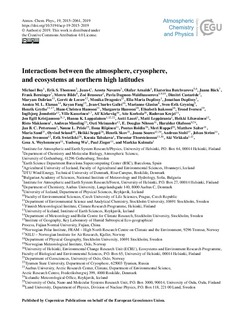Interactions between the atmosphere, cryosphere, and ecosystems at northern high latitudes
Boy, Michael; Thomson, Erik S.; Acosta Navarro, Juan-Camilo; Arnalds, Olafur; Batchvarova, Ekaterina; Bäck, Jaana; Berninger, Frank; Bilde, Merete; Brasseur, Zoe; Dagsson-Waldhauserova, Pavla; Castarede, Dimitri; Dalirian, Maryam; de Leeuw, Gerrit; Dragosics, Monika; Duplissy, Ella-Maria; Duplissy, Jonathan; Ekman, Annica; Fang, Keyan; Gallet, Jean-Charles; Glasius, Marianne; Gryning, Sven-Erik; Grythe, Henrik; Hansson, Hans-Christen; Hansson, Margareta; Isaksson, Elisabeth; Iversen, Trond; Jónsdóttir, Ingibjörg Svala; Kasurinen, Ville; Kirkevåg, Alf; Korhola, Atte; Krejci, Radovan; Kristjansson, Jon Egill; Lappalainen, Hanna K.; Lauri, Antti; Leppäranta, Matti; Lihavainen, Heikki; Makkonen, Risto; Massling, Andreas; Meinander, Outi; Nilsson, E. Douglas; Ólafsson, Haraldur; Pettersson, Jan B. C.; Prisle, Nønne L.; Riipinen, Ilona; Roldin, Pontus; Ruppel, Meri; Salter, Matthew E.; Sand, Maria; Seland, Øyvind; Seppä, Heikki; Skov, Henrik; Soares, Joana; Stohl, Andreas; Ström, Johan; Svensson, Jonas; Swietlicki, Erik; Tabakova, Ksenia; Thorsteinsson, Throstur; Virkkula, Aki; Weyhenmeyer, Gesa A.; Wu, Yusheng; Zieger, Paul; Kulmala, Markku
Journal article, Peer reviewed
Published version
Permanent lenke
http://hdl.handle.net/11250/2588186Utgivelsesdato
2019Metadata
Vis full innførselSamlinger
- Publikasjoner fra Cristin - NILU [1329]
- Vitenskapelige publikasjoner [1068]
Sammendrag
The Nordic Centre of Excellence CRAICC (Cryosphere–Atmosphere Interactions in a Changing Arctic Climate), funded by NordForsk in the years 2011–2016, is the largest joint Nordic research and innovation initiative to date, aiming to strengthen research and innovation regarding climate change issues in the Nordic region. CRAICC gathered more than 100 scientists from all Nordic countries in a virtual centre with the objectives of identifying and quantifying the major processes controlling Arctic warming and related feedback mechanisms, outlining strategies to mitigate Arctic warming, and developing Nordic Earth system modelling with a focus on short-lived climate forcers (SLCFs), including natural and anthropogenic aerosols. The outcome of CRAICC is reflected in more than 150 peer-reviewed scientific publications, most of which are in the CRAICC special issue of the journal Atmospheric Chemistry and Physics. This paper presents an overview of the main scientific topics investigated in the centre and provides the reader with a state-of-the-art comprehensive summary of what has been achieved in CRAICC with links to the particular publications for further detail. Faced with a vast amount of scientific discovery, we do not claim to completely summarize the results from CRAICC within this paper, but rather concentrate here on the main results which are related to feedback loops in climate change–cryosphere interactions that affect Arctic amplification. Interactions between the atmosphere, cryosphere, and ecosystems at northern high latitudes

